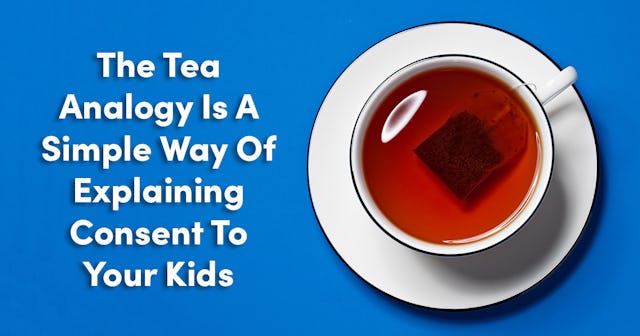The Tea Analogy Is A Brilliant (And Simple) Way Of Explaining Consent To Your Kids

When I was in high school, there were a few times I was in dicey situations and I blamed myself. Once, after my senior year of high school I was at a party at an older friend’s apartment. There were older boys there I didn’t know. They were friendly, we were drinking, and after telling my mother I would be spending the night at a friend’s house, I fell asleep on the floor next to a few of my girlfriends.
When I woke up, one of the “nice” boys was lying behind me stroking my side. Before I knew it, he was groping my breasts and heading for the zipper of my shorts. I got up and immediately woke up my friend (the guy who was hosting the party) and told him what happened. He stayed awake, lying next to me, until I was sober enough to drive home.
Then, there was a time when I was hooking up with a “friend with benefits” and he was being too aggressive. The voice in my head told me something was off, but it was muted by another voice saying we’d done this tons of times and I was never uncomfortable so what was my problem this time?
When I finally said something, he didn’t stop, and I could hear the voice in my head coming out of his mouth. “What’s your problem? We’ve done this tons of times. Relax.”
I could go on and on with different examples. I bet you could too. We all have stories about times when things seemed a little off. We’ve all had experiences when we weren’t sure if we were the cause of certain behaviors, only to take a step back and realize the other person involved was crossing a line.
As a mother to a girl, I talk about consent a lot. As a mother to boys, I talk about consent a lot.
Brodie Vissers/Burst
I’ve told them if someone is asleep and you put your hands on them, or you are asleep and someone puts their hands on you, that’s not consent.
I’ve told them it doesn’t matter what kind of relationship you have, or have had in the past, no means no.
I’ve told them it doesn’t matter where they are, how much they’ve had to drink.
I’ve told them to ask permission, and unless they have heard a very clear “yes” the answer is always “no.’” There are no guesses; this isn’t a game, and you are not allowed to overrule anyone. There are no gray areas in consent.
As parents, we need to be as clear and as concise as possible – and blogger Rockstar Dinosaur Pirate Princess brilliantly explained consent to kids by subbing the word “sex” with “tea.”
The concept is simple: compare having sex or fooling around with offering someone a cup of tea. RDPP explains that you can offer to make tea for someone, but unless they confirm that they want some, you wouldn’t make it — right?
And, if they were unconscious you wouldn’t expect them to drink the tea, right?
If they said they wanted some tea, then changed their mind and decided they didn’t want it after all, you wouldn’t pour it down their throat anyway, right?
This concept is so brilliant because it is a simple way for kids of all ages (and adults, because some folks still need a primer) to understand exactly what consent means. It shouldn’t be a cloudy area, but for some reason it still is.
My favorite part of this analogy is how she explains entitlement:
“They might say, ‘Yes, please, that’s kind of you,’ and then when the tea arrives they actually don’t want the tea at all. Sure, that’s kind of annoying as you’ve gone to the effort of making the tea, but they remain under no obligation to drink the tea. They did want tea, now they don’t. Sometimes people change their mind in the time it takes to boil that kettle, brew the tea and add the milk. And it’s okay for people to change their mind, and you are still not entitled to watch them drink it even though you went to the trouble of making it.”
Entitlement is a huge piece of consent, and the earlier we explain this to our children, and normalize the fact people are allowed to change their minds, the more they will understand and not feel as though anything is owed to them.
Even if you didn’t talk with your children when they were younger about this, it’s a great way to talk to your teens about it. There’s even a handy animated version.
Don’t forget: Talking about sex and consent with our kids isn’t a one-and-done conversation. It has to up brought up all the time, throughout their childhood and teen years, whether they are in a relationship or you think they have no interest in sex at all.
Sure, it can be a hard conversation to have, but it gives our kids an understanding that they will use for the rest of their lives. And analogies like this make our job as parents a little bit easier. Let’s face it, we need all the help we can get.
This article was originally published on